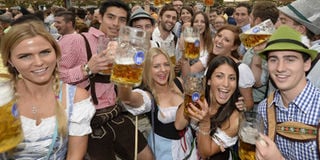Oktoberfest opens to toast of millions

Visitors celebrate with the first beer mugs the opening of the traditional Bavarian Oktoberfest festival at the Theresienwiese in Munich on September 20, 2014. Germany’s world-famous Oktoberfest kicks off with millions of revellers set to soak up the frothy atmosphere in a 16-day extravaganza of lederhosen, oompah music and, of course, beer. PHOTO | CHRISTOF STACHE
What you need to know:
- The first litre-size mug, the “Mass”, went to the head of the Bavaria regional government, Horst Seehofer.
- Foreign tourists, led by Italians and Americans, flock to Munich to enjoy the merriment but the festival remains largely a Bavarian event with more than 70 per cent of visitors hailing from the southern state.
MUNICH, Germany, Saturday
Germany’s world-famous Oktoberfest kicked off Saturday with the traditional tapping of the first barrel of beer, as millions of revellers are set to soak up the frothy atmosphere in the 16-day annual extravaganza.
With the cry of “O’zapft is” (“The keg is tapped”), the amber fluid officially began to flow at noon after Munich’s mayor, Dieter Reiter took a mallet and in four swings breached the 200-litre (53-gallon) barrel.
The first litre-size mug, the “Mass”, went to the head of the Bavaria regional government, Horst Seehofer.
Fourteen giant tents set up in the centre of Munich filled up quickly with people eager to imbibe after watching the parade of the brewers through the city streets under rainy weather.
“Oktoberfest is very famous, everyone in the world knows about it. We wanted to see it and now I can tell my friends I’ve been too,” said Moran Chen, 26, originally from Hong Kong but now living in Berlin.
At the festival site on the Wiesn fairgrounds thousands of serving staff carry millions of “Mass” glasses of beer from one of six historic Munich breweries, to punters seated at long tables in the tents.
Last year more than six million visitors drank 6.7 million litre-sized mugs of beer — more than twice the volume of an Olympic swimming pool.
The price of the beer always touches off a debate and in some tents this year was to creep over the 10-euro mark for the first time — to 10.10 euros ($13).
It all helps wash down the salty giant soft pretzels, dumplings, pork and grilled sausages that provide the customary hearty accompaniment.
For Johanna Kriessl, a 53-year-old from Frankfurt now a Munich resident, besides a ‘Mass’ she says what she likes about the festival is its “super, nice atmosphere”.
Oktoberfest customs call for the wearing of classic southern Bavarian dress — a dirndl, or low-cut blouse with a laced-up bodice and aproned full skirt for women, and the lederhosen leather shorts with embroidered braces for men.
Foreign tourists, led by Italians and Americans, flock to Munich to enjoy the merriment but the festival remains largely a Bavarian event with more than 70 per cent of visitors hailing from the southern state.
The Oktoberfest, originally held in October as the name suggests but brought forward to September to take advantage of warmer weather, began in 1810 to mark the marriage of the prince of Bavaria to Princess Therese of Saxony-Hildburghausen.



